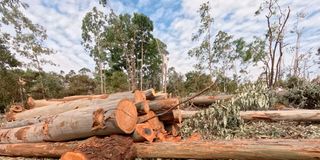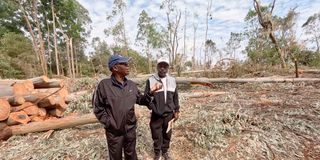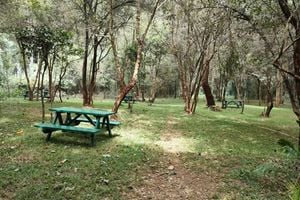Conservationists raise concern over removal of eucalypus from Karura

A section of Karura Forest where eucalyptus trees have been felled.
What you need to know:
- More than 50,000 people visit the forest every month.
An environmental lobby has questioned the phasing out of eucalyptus trees in Karura Forest, which began in late 2024.
Speaking while on a tour of Karura, Green Blue Foundation Africa’s representatives expressed their displeasure with the bringing down of mature eucalyptus trees in sections of the forest, saying it defeats the government’s ambitious tree-planting campaign as part of its broader climate change mitigation and adaptation strategies.

Green Blue Foundation Africa Chairperson, Dr Wilfred Kiboro, and the lobby’s President Bedan Mbugua, tour a section of Karura Forest where eucalyptus trees are being felled.
According Mr Bedan Mbugua, the lobby’s president, the ongoing felling of exotic trees in the forest is a disservice to the memory of the late Nobel peace prize winner and environmentalist Professor Wangari Maathai, who in the 90’s fought against the annexation of the forest for development by the then government.
“The government has justified this action by stating that the eucalyptus trees must be replaced with indigenous species. While the promotion of indigenous trees is vital for biodiversity, this approach oversimplifies a much larger environmental crisis,” he said.
Karura Forest, a 2,000-hectare urban forest on the outskirts of Nairobi, has become a popular destination for joggers and nature lovers since the Friends of Karura Forest, a community forest association, opened its gates 15 years ago. More than 50,000 people visit the forest every month.
Walter Anyona, a cyclist, says the environment and terrain in the forest helps him prepare for races. He has been frequenting the forest every weekend for the last eight years.
“I cycle here to disengage from a busy week. I love the cool breeze and the canopies. I am currently practising for an upcoming tournament,” he says.
He, however, confesses that the felling of trees in sections of the cycling path has made his time in Karura a bit strenuous.
“The sudden clearing of trees has an immediate impact on the environment and even though I understand they are replacing the trees, may be they should have done it first before cutting,” he tells Climate Action.
A few metres away, a group of youth who are also making their way into the forest for a hike stop at an area that is currently being cleared. They are also concerned about the changes going on in the forest.
“I actually didn’t know this was happening. I know how hard Wangari Maathai fought for these trees, and it’s important for us to take care of the Earth,” says Lulu Musyimi.
The debate over the removal of eucalyptus trees from the environment has been ongoing. While the tree has wood and timber benefits, the overall environmental impact is negative as the tree depletes all the groundwater due to its high water consumption.
“ When we took over forest management in 2011, Karura had 75 per cent of eucalyptus trees, but now we have 55 per cent of the forest under indigenous trees. The eucalyptus tree is an invasive plant, and nothing can grow under it . It consumes a lot of ground water,” says Prof Karanja Njoroge, a board member and chairperson of Friends of Karura’s Community Relations and Engagement Committee.
But Green Blue Foundation Africa maintains that the trees were already serving their ecological purpose and should have been left in place.
“At a time when Kenya is experiencing severe water shortages and devastating effects of climate change, every tree, whether indigenous or exotic, matters. Eucalyptus trees, like all other trees, play a crucial role in carbon sequestration, water regulation and soil stabilisation,” said Mr Mbugua
Additionally, the lobby says the phasing out of the eucalyptus trees is a myopic move by the Kenya Forest Service (KFS), which is leading and coordinating the national campaign to plant 15 billion trees in Kenya.
“What is disturbing is that the logging of trees is happening right here at the KFS headquarters. We would like to know who is behind this destruction of the forest because it doesn’t make sense,” says Dr Wilfred Kiboro, the chairperson of Green Blue Foundation Africa.
However, Friends of Karura say what has been happening is the restoration of indigenous trees that once colonised the forest before colonialists introduced exotic tree species like the eucalyptus.
“I have no problem with the perception that ‘a standing tree is better than a fallen tree’. But I want those opposed to what we are doing to appreciate that a fallen bad tree and the raising of a good tree is even better, “ says Prof Njoroge.
Environment Cabinet Secretary Aden Duale has also defended the ongoing logging in Karura, saying it is part of a management plan that got delayed by the 2018 moratorium on logging in all public forests instituted by former President Uhuru Kenyatta. “It is the Kenya Kwanza government that lifted the logging moratorium. The negative forces spreading fake news on social media have said we are hiving of land to private developers, but there’s nothing like that. This is a programme that will continue until we remove the 30 per cent of commercial trees in Karura,” said Mr Duale.
Friends of Karura association says since it started rehabilitating the forest, it has managed to replace two thirds of the eucalyptus trees that formed a huge percentage of the forest, with indigenous trees.
“ In the next 10-15 years, we expect to have a 100 per cent restoration of the African Mountain Forest that was here in the pre-colonial era,” explains Prof Njoroge
The Green Blue Africa Foundation has also called for transparency in the harvesting of trees. “We urge the government to immediately halt the destruction of eucalyptus trees in Karura and prioritise strategies that genuinely increase forest cover rather than diminish what already exists,” says Mr Mbugua.
While the Ministry of Environments has justified the logging of eucalyptus trees in Karura as part of a 20-year participatory forest management strategy between KFS and Friends of Karura, Green Blue Foundation Africa maintains that the battle for the forest is not just about preventing land grabbing, “ rather safeguarding Kenya’s natural heritage for future generations”.





